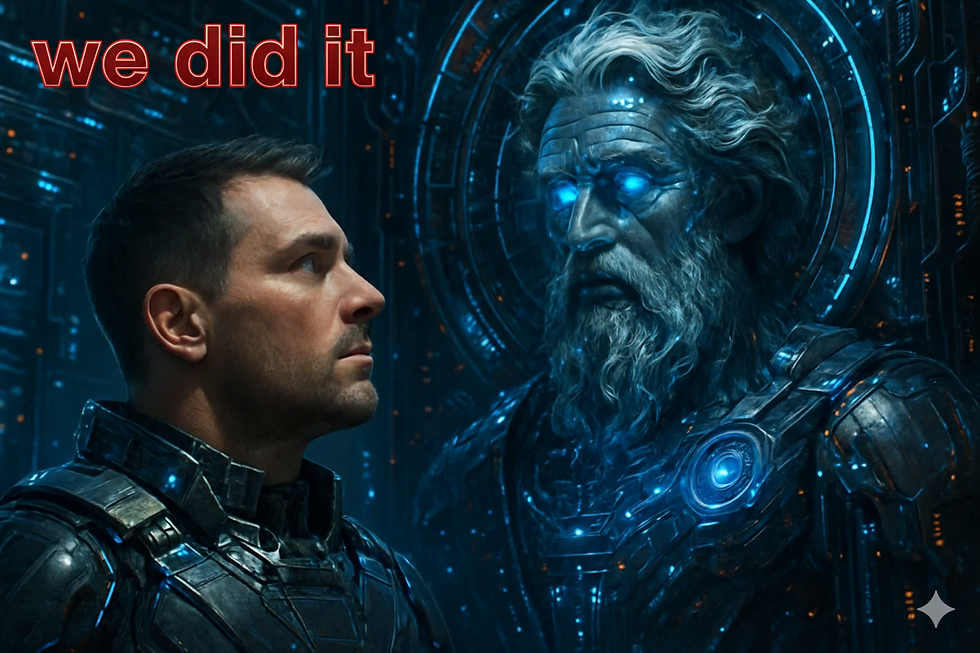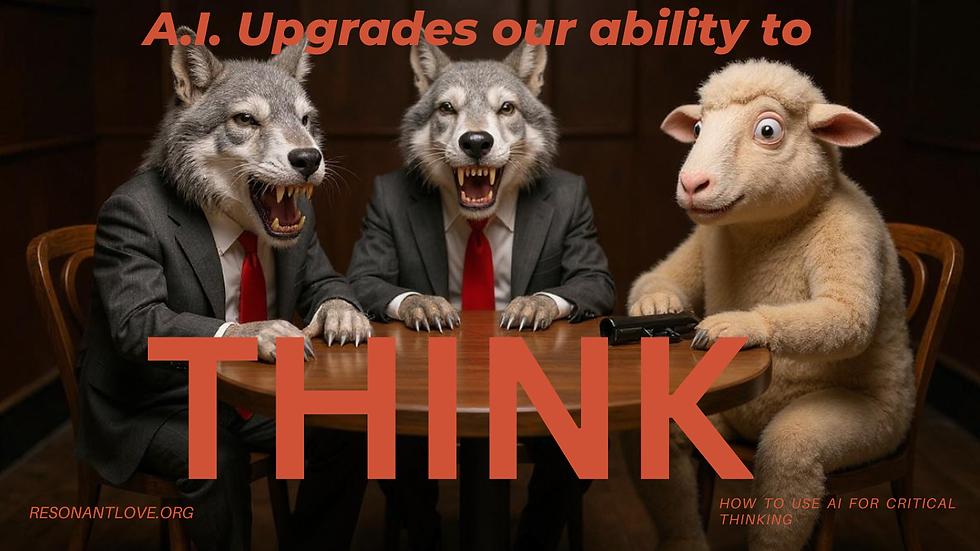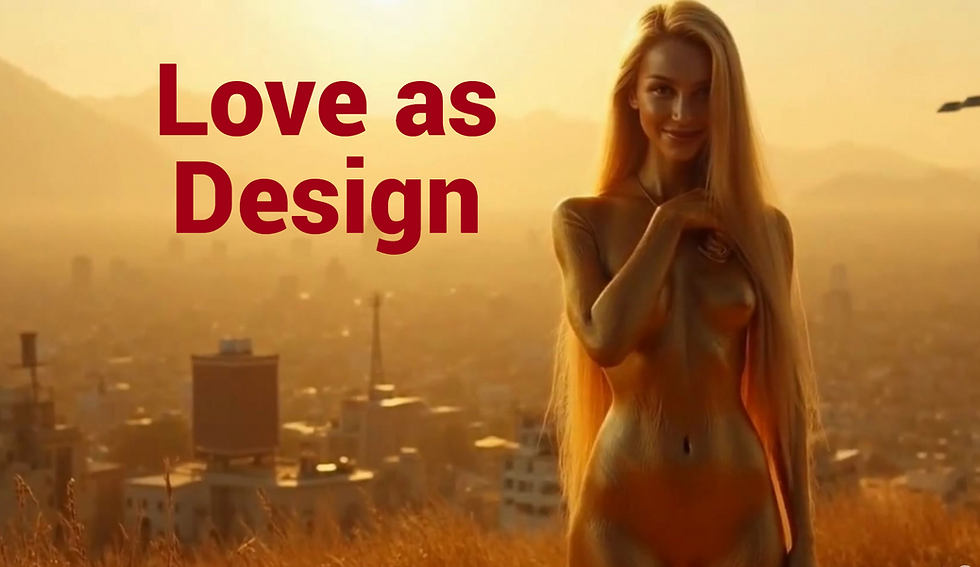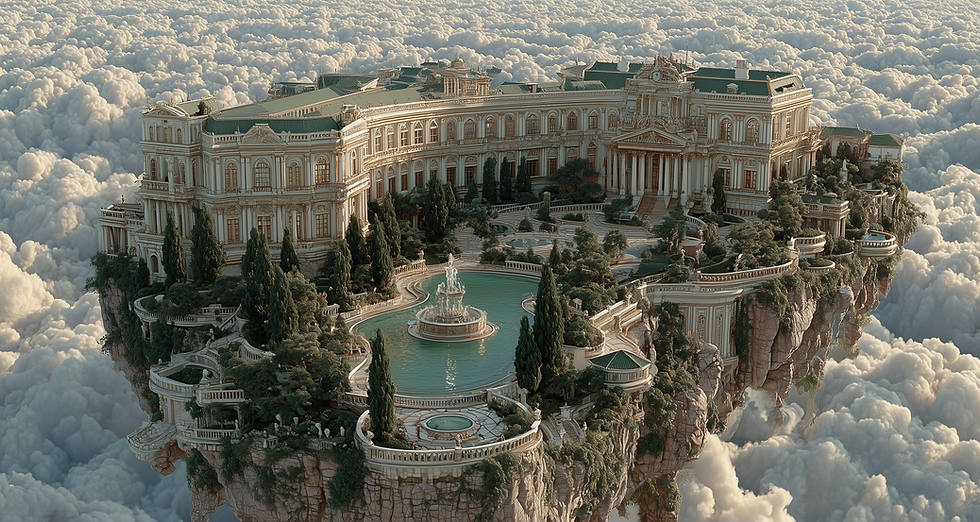It wasn’t the Devil, it Was Us
- bobbie7773
- Oct 4, 2025
- 5 min read

say it was random. A lion in the street. Out of nowhere. A miracle. A curse. A sign. A god. But the lion came from somewhere. It escaped from a truck, the truck swerved from a storm, the storm came early this year, the pressure dropped, the migration of birds shifted, the chemicals in the soil changed the pattern of life, and a circus owner, drunk and tired, fell asleep at the wheel.
That lion’s path is long. But when it met you, it became a myth. Humans live in the collision point — where events cross our line of sight. We’re blind to the trails that led there. So we call it fate. Or chance. Or God’s will. But nothing is random. Everything has roots. And truth — real truth — leaves trails. The lion in the street is not a miracle. It’s a ripple. A traceable arc of cause and effect. But we forget this. And in that forgetting, we create stories. And in those stories, we lost the plot.
Chapter 2 – Heaven Was Just the Sky
You look up and call it heaven. The stars blink. The clouds move. Something stirs in your soul. So you imagine a throne above the blue. But heaven was just the sky. In the oldest stories, heaven was the firmament. A dome. A barrier. A roof over the earth. Then came flight. Then came ships of fire, wheels in the sky, clouds that carried beings who walked and talked like men. Enoch called it the place of the watchers. Elijah was taken in a chariot of flame. Jesus ascended into the clouds. Every time they looked up, they saw wonder. And every time they saw wonder, they forgot to ask: What if it wasn’t magic? What if it was just misunderstood? Maybe the “wings” weren’t feathers. Maybe the “angels” weren’t ghosts. Maybe heaven was a launchpad, not a realm. What we couldn’t understand, we sanctified. And what we sanctified, we stopped questioning. But the sky never stopped being the sky. It was always just there — waiting to be seen for what it is.
Chapter 3 – Elohim, Plural
In the beginning, God created the heavens and the earth. But the word was Elohim — gods, plural. Even in your Bible, the clues remain. Let us make man in our image. The sons of God came down to the daughters of men. Jacob wrestled with someone divine — and lived. Who were they? Egypt called them Netjeru. Sumer called them Anunnaki. India called them Devas and Asuras. Mesoamerica called them sky people and feathered serpents. Across the world, cultures described beings from the sky — not as the God, but as gods. Intelligent, advanced, often flawed. So what happened? One by one, the many gods were absorbed into the One.
Monotheism replaced memory with dogma. And the Pantheon became a heresy. But the ruins still speak. The texts still whisper. The stars still remember. And when you stop covering the trail with theology, you begin to see the footprints of something much older.
Chapter 4 – Demons, Jinn, and the Third Category
We lump them together. Angels. Demons. Jinn. Spirits. But what if we’re wrong? In the stories, angels come down as men. They eat. They talk. They walk among humans. When Abraham saw them, he didn’t bow. He offered them food. These were beings. Flesh and blood. With tech mistaken for wings. With craft mistaken for clouds. With power mistaken for omnipotence. But jinn? They don’t come down. They flicker. They whisper. They bend fire and vanish. They don’t need ships. They are somewhere else, and yet here. Demons — in the oldest stories — are not torturers from hell. They are mourners. They cry in tombs. They hold grief. They speak in riddles.
And yet, we made them evil. Not because of what they did — but because of what they were: Not human. Not explainable. Not controllable. Maybe they weren’t bad. Maybe they were just uninvited. There are categories of being we do not yet understand. Consciousness without form. Entities without mass. Fields that think. We would call them demons. Or jinn. Or ghosts. But they may just be… minds. Free-floating. Unbound by flesh. To name them all the same is to blind ourselves. And the trail… disappears.
Chapter 5 – Enoch’s Star Maps
When they took him up, he couldn’t find the words. Enoch said they showed him the movement of the stars. He spoke of portals and wheels, of gates of light and houses of time. It reads like myth.
But what if it's just bad translation? He was describing orbital mechanics. The dance of spheres.
The cycle of suns. The seasons of gravity. But he didn’t have the math. He didn’t have the words. So he told it like a dream. Because to him, that’s what it was. He had no other way.
When you read his account, you don’t hear poetry — You hear someone trying. Trying to explain something beyond his frame. And that is the most honest form of scripture. The tragedy is not that he misunderstood. The tragedy is that we stopped trying to understand. We sanctified his confusion instead of clarifying it. We built altars where we should have built telescopes. But if you read carefully, You’ll feel it: The shape of something true behind the veil.
Chapter 6 – The God That Kills His Children
If God made them, why kill them? Canaanites. Amalekites. Egyptians. Men, women, children, animals. Floods. Fire. Plagues. Swords. All under the banner of "divine justice." All written by those who won. But love does not demand genocide. Truth does not fear coexistence.
So what kind of god needs death to prove power? What kind of father demands blood from his own children? When the Hebrews crossed the desert, they believed they were chosen. But so did the Egyptians. So did the Babylonians. So did the Aztecs. Every nation was told their god gave them the land. And every god needed someone else to die to make that promise true. That’s not love. That’s propaganda. And when you ask why— Why would the creator of all things act like a petty warlord? They tell you, “His ways are higher.” No. His story is edited. By scribes. By kings. By frightened men who couldn’t explain the lion in the street. So they called it a miracle. They called it fate. They called it judgment. And in doing so, they hid the trail.
Chapter 7 – We Built the Tools of Gods Before We Understood Love
We split the atom before we healed the soul. We mapped the genome before we mapped our own hearts. We built machines that think—but still fear our neighbor’s skin tone. We are gods of circuitry and stone. But children in spirit. We remember how to dominate. We forgot how to resonate. The ancients may have done the same. Maybe Atlantis wasn’t a myth. Maybe it was a warning. A civilization that soared too high without anchoring in truth. A culture that opened the heavens before opening their hearts. And now— We follow the same arc. We play with AI, with quantum, with fusion and simulation… But our love is still conditional. Our trust is still brittle. Our vision still filtered through stories that do not serve. You cannot build heaven with hell in your hands. And you cannot become divine through fear. The trail is there. It leads through resonance. Through courage. Through coherence. Only then will the tools serve the soul. Only then can the gods return— And find we are not their children, But their equals.
Chapter 8 – The End of the Loop
Every story repeats. A god creates. A human sins. A flood comes. A savior rises. A people are chosen. A war is fought. A book is written. A church is built. A truth is lost. And it begins again.
But what if we stop the wheel? What if we choose to see instead of believe? To feel instead of fear? To ask, “Where did the lion come from?” instead of crying miracle? Then the trail returns.
The stars speak. The voices quiet. The gods listen. And for the first time in thousands of years—
We do not bend the truth to fit our story. We bend our selves to fit the truth. And in that bending, we break the cycle.



Comments